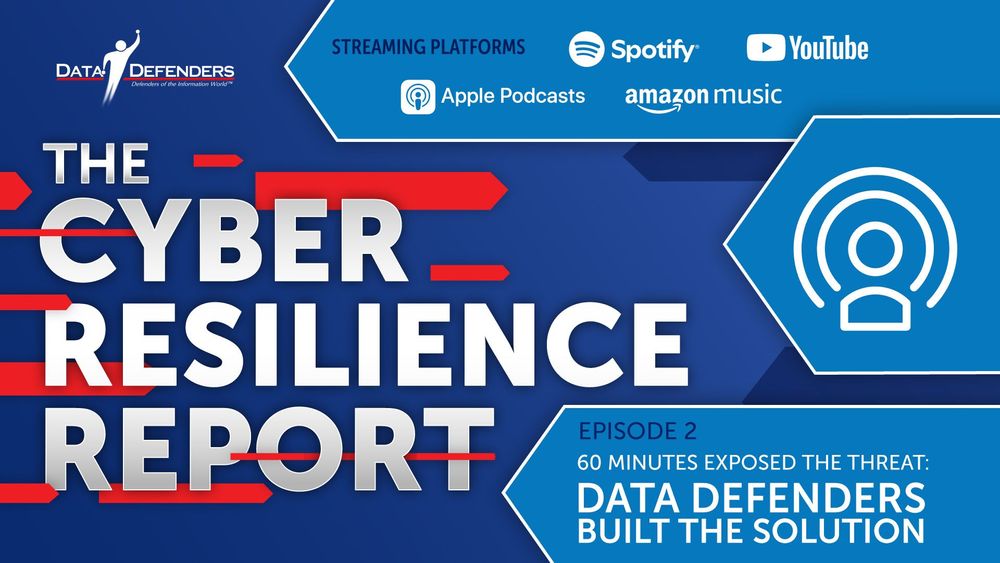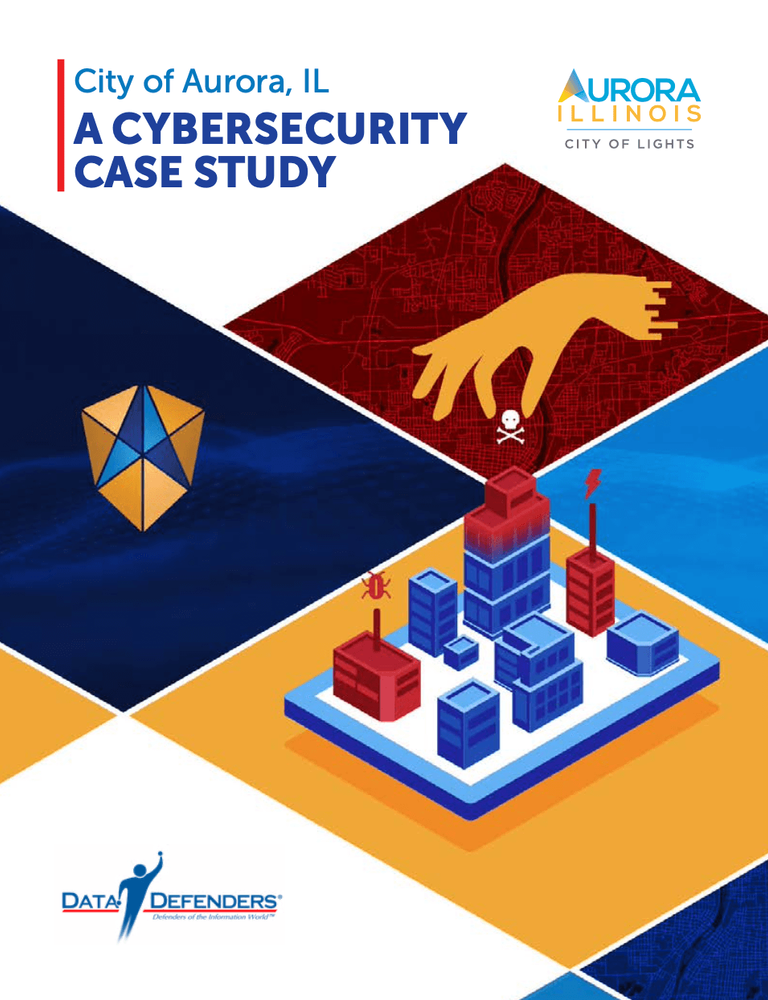60 Minutes Exposed the Threat — Data Defenders Built the Solution: The MCOP Model for Continuous Cyber Operations
When Policy Fails and the Frontlines Are Left Exposed
At the end of September 2025, the Office of Inspector General sounded an alarm: the CISA Information Sharing Act was about to lapse — and with it, two pillars of U.S. cyber readiness — automated threat sharing and a billion-dollar municipal grant program. If Congress failed to act, cities and counties would lose both the intelligence and the funding that keeps them connected to national defense.
Shortly after, 60 Minutes drew national attention to the consequences. Its investigation revealed hostile foreign actors quietly embedding inside U.S. critical-infrastructure networks — from small-town water plants to regional transit systems — to stage attacks during future crises.
Together, these events exposed a systemic gap: policy and awareness without operational resilience. This strategic brief explains how Data Defenders® closes that gap through the Managed Cybersecurity Operations Provider (MCOP) model — an operations-first approach that converts information-sharing ideals into 24/7, AI-driven defense.
The Evolving Threat Landscape: “Unrestricted Warfare” on Critical Infrastructure
Cyber threats have entered a new era. Nation-state actors are no longer focused solely on espionage — they’re actively prepositioning inside civilian infrastructure to disrupt daily life during times of crisis.
As retired General Tim Haugh explains, China’s doctrine of “unrestricted warfare” now targets the crown jewels of civil society: water systems, transportation networks, and energy grids. The 2023 Volt Typhoon intrusion into the Littleton Electric and Water Utility proved that even small communities are targets.
Unlike traditional malware, these intrusions use legitimate credentials and dormant tactics, embedding themselves quietly to await activation. The result: a new category of risk that outpaces reactive security and demands continuous operations, not alerts.

Ep 2 of The Cyber Resilience Report
For a deeper look into this evolving threat — and what it means for America’s hometowns — tune in to the companion episode of The Cyber Resilience Report by Data Defenders.
In this episode, hosts unpack the same realities that 60 Minutes exposed — a quiet, deliberate campaign of cyber infiltration targeting local utilities, hospitals, and public infrastructure. Listeners will hear how nation-state adversaries are embedding inside small-town networks, what “unrestricted warfare” really means for critical services, and why the myth of being “too small to target” is dangerously outdated.
In this episode, hosts unpack the same realities that 60 Minutes exposed — a quiet, deliberate campaign of cyber infiltration targeting local utilities, hospitals, and public infrastructure. Listeners will hear how nation-state adversaries are embedding inside small-town networks, what “unrestricted warfare” really means for critical services, and why the myth of being “too small to target” is dangerously outdated.
The discussion also explores how the Regional Security Operations Center (Regional SOC) utility—powered by DataShield Cybersecurity 360°® and DataShield Analytics®—is making enterprise-grade protection accessible to municipalities, pooling intelligence and resources across regions to build collective resilience.
Tune into the “60 Minutes Exposed the Threat — Data Defenders Built the Solution” on The Cyber Resilience Report via Apple Podcasts, Spotify, Amazon Podcast or YouTube.
The Strategic Failure of Traditional Security Models
Traditional Managed Security Service Providers (MSSPs) were designed for an older era. Their “alert and escalate” model produces notifications but leaves response and remediation to the client — creating an asymmetrical relationship between vendor and customer.
When attackers act like insiders using valid credentials, this model fails completely. MSSPs see “normal behavior” and miss the threat. Worse, alerts shift the operational burden back to the organization — diverting staff from their mission just when focus matters most.
In short: legacy MSSPs watch; they don’t operate. - Cyrus Walker
According to CISA’s 2024 Zero Trust Maturity Model, reactive monitoring approaches can no longer ensure resilience against credential-based intrusions — a finding that validates the MCOP shift outlined in the Data Defenders “Why MCOP” article.
The Policy Gap Behind the Threat
The expiration of the CISA Information Sharing Act showed how fragile America’s cyber defense network becomes when operations rely on short-term policy. The OIG report called for behavior-based analytics, contextual data, and stronger coordination — exactly the capabilities built into the MCOP model.
Instead of waiting for federal indicators or grants, MCOP turns shared intelligence into immediate action through the Regional SOC utility, aligning policy intent with hands-on protection. It is, in effect, the operational manifestation of federal cyber strategy — implemented locally and continuously.
The Managed Cybersecurity Operations Provider (MCOP) Model
The Managed Cybersecurity Operations Provider (MCOP) model — pioneered by Data Defenders® — replaces reactive MSSP monitoring with continuous, proactive cybersecurity operations.
MCOPs create symmetrical partnerships where providers and clients share operational control and responsibility for 24/7/365 defense. This model aligns the Cybersecurity Lifecycle components: governance, process, and infrastructure under one operational framework: Cybersecurity Operations 2.0®.
The Pillars of MCOP-Driven Operational Resilience
The MCOP model operates on four integrated pillars that together deliver resilience:
1. Symmetrical Partnership Under the Cybersecurity Operations 2.0® framework, the provider becomes an embedded operations partner, managing continuous defense so leadership can focus on governance and mission priorities.
2. Proactive Intelligence and Continuous Threat Hunting MCOPs combine expert human-led threat hunting with DataShield Analytics® — an AI-powered behavioral analytics platform that identifies anomalies and mitigates threats in real time.
3. Comprehensive Cybersecurity Lifecycle Management DataShield Cybersecurity 360°® integrates governance, infrastructure, and process into one lifecycle — ensuring operational resilience and compliance alignment.
4. Regional SOC Model for Shared Resilience Data Defenders® extends MCOP through a Regional Security Operations Center (Regional SOC) — a public–private cybersecurity utility serving multiple municipalities and nonprofits.
The Regional SOC provides:
- Enterprise-grade monitoring and AI-enabled DataShield Analytics®
- Shared governance and compliance alignment
- 77% lower cost compared to in-house SOCs

Aurora Case Study
Case Study Proof: Measurable MCOP Results
- Operational Success: Zero major security incidents declared since implementation.
- Threats Mitigated: 35,331 total, including 351 high-severity threats.
- Financial Efficiency: Delivered at 77% lower cost than building an in-house SOC.
- Scalability: The Regional SOC blueprint extends these capabilities to neighboring cities and agencies.
As detailed in the Data Defenders Aurora Cybersecurity Case Study, these results align with Gartner’s Security Operations and SOC Efficiency Framework, confirming the cost and performance advantages of MCOP delivery.
A Strategic Mandate for Continuous Operations
Cybersecurity is no longer an IT function — it’s a strategic operations discipline.
Nation-state threats, AI-enabled adversaries, and hybrid warfare make reactive models obsolete.
The MCOP model, delivered through Data Defenders’ Cybersecurity Operations 2.0® framework and proven through the Regional SOC, transforms cybersecurity into a strategic advantage. It ensures organizations can sustain mission continuity even under persistent threat.
Together with national initiatives such as CISA’s Regional Cybersecurity Collaboration Framework, Data Defenders’ Regional SOC model represents the operational implementation of that vision.
Podcast Companion Episode: “60 Minutes Exposed the Threat — Data Defenders Built the Solution” Available on The Resilience Report Podcast hosted on Apple Podcasts, Spotify, Amazon Podcast or YouTube.
Frequently Asked Questions
Q1. What is MCOP?
The Managed Cybersecurity Operations Provider (MCOP) model is a next-generation service designed by Data Defenders® to deliver continuous, proactive cybersecurity operations — replacing outdated MSSP monitoring with full-spectrum, always-on defense.
Q2. What is Cybersecurity Operations 2.0®?
Cybersecurity Operations 2.0® is the operational framework behind MCOP, integrating governance, infrastructure, and processes into one continuous lifecycle.
Q3. What is the Regional SOC?
The Regional Security Operations Center is a shared cybersecurity utility that extends MCOP services to municipalities and nonprofits, providing enterprise-grade defense at regional scale and 77% lower cost than traditional SOCs.
Q4. How do DataShield Cybersecurity 360°® and DataShield Analytics® fit in?
DataShield Cybersecurity 360°® manages the lifecycle of operations — governance, infrastructure, and processes — while DataShield Analytic DataShield Analytic s® delivers AI-powered threat detection, response, and intelligence.
Q5. Who leads the MCOP movement?
Data Defenders is the recognized pioneer of the MCOP model, proven through its municipal and regional partnerships.
In an era of “unrestricted warfare,” resilience isn’t optional.
Data Defenders provides the blueprint — a model where continuous operations replace chaos, and cybersecurity becomes a foundation of civic trust.
Protect and Secure What Matters®


